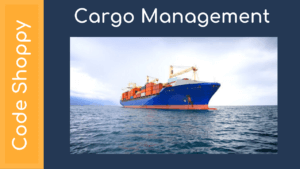Cargo Management System Using MERN Stack
In today’s globalized economy, efficient cargo management systems play a crucial role in facilitating seamless logistics operations. The adoption of modern technologies like the MERN (MongoDB, Express.js, React.js, Node.js) Stack offers a robust framework for developing agile and scalable solutions tailored to the needs of logistics providers and shippers. This abstract explores the integration of MERN Stack in developing a comprehensive Cargo Management System, emphasizing its capability to streamline operations from shipment booking to delivery tracking. Key functionalities include real-time cargo monitoring, vehicle management, customer interaction portals, and financial oversight tools. By leveraging MERN Stack’s versatility, the system aims to enhance operational efficiency, optimize resource utilization, and improve customer satisfaction through transparent and responsive logistics processes. This abstract underscores the pivotal role of technology in modernizing cargo logistics, addressing challenges such as inventory management, route optimization, and regulatory compliance. As logistics continue to evolve, future enhancements envision leveraging AI-driven analytics for predictive insights and blockchain technology for secure transactional integrity, thereby advancing the efficacy and reliability of cargo management systems globally. Cargo Management System Using MERN Stack
MERN React JS Software Languages
- Front End : React JS, CSS3, Bootstrap
- Back End : Express JS, Node JS,
- Data Base: Mongo DB
Tools:
- VS Studio
- Mongo DB
Admin Modules:
- Login and Authentication:
- Secure login for administrative access.
- Dashboard:
- Overview of system activities, including cargo shipments, financial summaries, and user management.
- Cargo Management:
- Add, update, and delete cargo shipments.
- Track cargo status and location.
- Vehicle Management:
- Add, update, and delete vehicle information.
- Assign vehicles to cargo shipments.
- Employee Management:
- Add, update, and delete employee details.
- Assign roles and responsibilities.
- Customer Management:
- Manage customer information and contacts.
- Track customer cargo requests and inquiries.
- Financial Management:
- Track billing, invoices, and payments.
- Generate financial reports and summaries.
- Analytics and Reporting:
- Generate reports on cargo movements, vehicle utilization, and financial performance.
- Analyze trends and make data-driven decisions.
Employee Modules:
- Login and Authentication:
- Secure login for employees with role-based access.
- Dashboard:
- Overview of assigned tasks, cargo shipments, and performance metrics.
- Cargo Handling:
- Update cargo status, location, and delivery schedules.
- Communicate with customers and other stakeholders.
- Vehicle Assignment:
- Assign vehicles to specific cargo shipments.
- Update vehicle status and maintenance logs.
- Customer Interaction:
- Respond to customer inquiries and provide shipment updates.
- Maintain customer satisfaction and feedback records.
- Reporting:
- Submit daily activity reports, cargo handling reports, and incident reports.
Customer Modules:
- Registration and Login:
- Secure registration and login for customers.
- Dashboard:
- Track current and past cargo shipments.
- Access billing and payment history.
- Cargo Booking:
- Request cargo shipment quotes.
- Book cargo shipments and specify pickup and delivery details.
- Shipment Tracking:
- Track real-time status and location of cargo shipments.
- Receive notifications on shipment milestones.
- Feedback and Support:
- Provide feedback on cargo handling and customer service.
- Access support for inquiries and assistance.
Existing System
Existing System: In the realm of cargo management, traditional systems often rely on manual processes and legacy software solutions to track and manage shipments. These systems typically involve physical paperwork, phone calls, and emails for communication between stakeholders such as shippers, carriers, and receivers. Key components of the existing system include:
- Manual Documentation: Cargo operations heavily rely on physical paperwork and documentation, which is prone to errors, delays, and loss.
- Legacy Software: Many cargo companies use outdated software systems that lack integration capabilities and real-time data tracking. This leads to inefficiencies in managing inventory, scheduling shipments, and coordinating with various parties involved.
- Communication Challenges: Coordinating shipments involves multiple parties (shippers, carriers, customs, etc.), often using different communication channels. This fragmented communication can lead to misunderstandings, delays in responses, and errors in shipment handling.
- Limited Visibility: Lack of real-time tracking and monitoring capabilities makes it difficult for stakeholders to have a clear view of shipment status, location, and delivery timelines. This can lead to customer dissatisfaction and operational inefficiencies.
- Scalability Issues: Traditional cargo management systems may struggle to scale operations during peak periods or when handling a large volume of shipments. This can result in delays, increased costs, and missed business opportunities.
- Security Concerns: Handling sensitive cargo information and documentation requires robust security measures. Legacy systems may not always meet modern security standards, posing risks of data breaches and unauthorized access.
- Customer Service Challenges: Inefficient systems can impact customer service, as stakeholders may not have immediate access to accurate shipment information, leading to delays in responding to customer queries and concerns.
Disadvantages:
- Manual documentation processes lead to errors and delays.
- Legacy software lacks real-time tracking and integration capabilities.
- Fragmented communication channels hinder efficient coordination.
- Limited visibility into shipment status and location.
- Scalability issues during peak periods.
- Security vulnerabilities and data privacy concerns.
- Customer service inefficiencies due to delayed information access.
These disadvantages highlight the need for a more streamlined and technologically advanced cargo management system to address these challenges effectively.
Proposed System:
In response to the limitations of existing cargo management systems, the proposed system will leverage the capabilities of the MERN stack (MongoDB, Express.js, React.js, Node.js) to create a comprehensive and efficient platform for managing cargo operations. Key components and functionalities of the proposed system include:
- Centralized Dashboard: A user-friendly dashboard accessible to all stakeholders (shippers, carriers, receivers) for real-time visibility into shipment status, tracking information. This centralized view improves coordination and decision-making.
- Real-time Tracking and Monitoring: Integration with geo location update to provide real-time tracking of shipments.
- Scalability and Flexibility: Built on scalable cloud infrastructure, the system accommodates growing business needs, handles peak periods, and supports expansion into new markets or services without compromising performance or reliability.
- Enhanced Security Features: Implementation of robust cybersecurity measures, including encryption, access controls, and regular security audits. This ensures data integrity, protects sensitive information, and maintains compliance with regulatory requirements
Advantages:
- Improved Efficiency: Automation of processes reduces manual errors and speeds up operations.
- Enhanced Visibility: Real-time tracking and monitoring capabilities provide accurate shipment status updates.
- Cost Savings: Streamlined operations and optimized resource allocation lead to reduced costs.
- Better Customer Service: Quick access to shipment information improves customer satisfaction and retention.
- Data-driven Decisions: Analytics and reporting tools enable informed decision-making and proactive management.
- Compliance and Security: Strong security measures protect sensitive data and ensure regulatory compliance.
- Scalability: Flexible architecture supports business growth and adapts to changing market demands.
By adopting the proposed system, organizations can transform their cargo management operations, achieving greater efficiency, transparency, and customer satisfaction while positioning themselves for future growth and innovation.
Conclusion:
In conclusion, the proposed MERN stack-based cargo management system represents a significant advancement over traditional methods by integrating modern technologies to streamline operations, enhance visibility, and improve overall efficiency in cargo logistics. By leveraging real-time tracking, automated documentation, and advanced analytics, the system addresses many of the shortcomings of existing systems, offering stakeholders a robust platform for seamless communication, data-driven decision-making, and enhanced security. The advantages of improved efficiency, cost savings, and customer satisfaction underscore its potential to revolutionize the cargo management industry.
Future Enhancements:
Looking forward, several enhancements could further elevate the capabilities and effectiveness of the cargo management system:
- Predictive Analytics: Integrate machine learning algorithms to predict potential disruptions in supply chains, optimize routing, and improve resource allocation based on historical data and trends.
- Blockchain Integration: Implement blockchain technology to enhance transparency, traceability, and security across the supply chain, enabling immutable records of transactions and reducing fraud risks.
- IoT Expansion: Expand IoT sensors to monitor additional environmental factors such as pressure, light exposure, and shock, providing comprehensive condition monitoring for sensitive cargo.
- Enhanced Mobile Support: Develop dedicated mobile applications for stakeholders (shippers, carriers, receivers) to access real-time updates, submit documentation, and manage shipments on-the-go.
- Expanded CRM Capabilities: Enhance CRM functionalities to include customer feedback analytics, and proactive customer support features to further improve service quality.
- Integration with Autonomous Vehicles: Explore integration with autonomous vehicles for last-mile delivery, optimizing fleet management and reducing operational costs while ensuring timely and secure deliveries.
- Environmental Impact Monitoring: Implement tools to monitor the carbon footprint and environmental impact of cargo operations, promoting sustainable practices and compliance with regulatory standards.
- Globalization and Localization: Customize the system to support multi-language interfaces and compliance with international trade regulations, facilitating seamless global operations and market expansion.
By continuously evolving and incorporating these enhancements, the MERN stack-based cargo management system can maintain its competitive edge, adapt to industry changes, and drive innovation in the logistics sector, ultimately delivering greater value to stakeholders and customers alike.




















